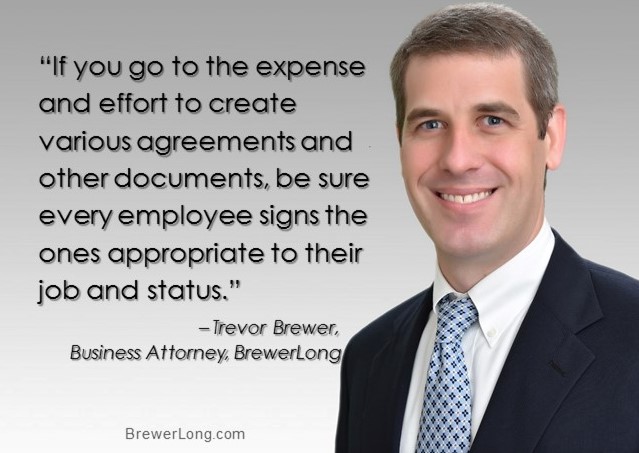
Know the Legal Issues Related to These Three Employment-Related Documents
Whether you’re getting ready to hire your first employee or you’ve had hundreds of people on your payroll for years, it’s essential that your employment documents work for you rather than against you. That means they need to be clearly written, comprehensive, and compliant with all applicable laws and regulations.
There is a long list of documents you’ll use as you recruit, hire, manage, and terminate workers, and they will vary based on your specific industry and needs. But three important employment-related documents apply to virtually every operation:
- Employee handbook
- Work-for-hire agreements
- Restrictive covenants agreements
Employee Handbook
The employee handbook (sometimes called an employee manual or policy and procedure manual) is the document that establishes the ground rules for how you want people to conduct themselves within their capacity as your employees. Employee handbooks typically cover policies on such issues as:
- Paid and unpaid time off policies, including holidays, vacation, sick leave, family medical leave and other types of leave.
- Employee behavior, including attendance, dress code, meal and rest breaks, as well as bans on harassment and discrimination and your general expectations of employee conduct.
- Social media policy, including whether employees can access social media at work, the use of company information and trademarks on the social media accounts of employees and their family and friends, and how employees should respond to offensive or negative posts about the company made online by others.
- Compensation, including when and how employees are paid, overtime policies, and pay grade structures.
- Benefits, including health and other insurance coverage, other benefits you may offer, and eligibility criteria.
In addition, there are likely other issues specific to your operation or industry that you may want to cover in your employee handbook.
A well-crafted employee handbook eliminates misunderstandings and ambiguity regarding what is acceptable workplace conduct and what is not. It also provides the employer with a legal foundation should disciplinary action, up to and including termination, be necessary.
Work-for-Hire Agreements
A work-for-hire or work-made-for-hire agreement specifies that whatever materials your employees produce during the course of their work belong to the company. While this most commonly applies to intellectual property and creative endeavors such as writing, design, and photography, it’s a good idea to have every employee sign a work-for-hire agreement stipulating that whatever they produce in their capacity as your employee becomes the company’s property.
Restrictive Covenants Agreements
It’s important to take appropriate steps to protect your proprietary business information as well as your customer interests and relationships through the use of restrictive covenants agreements. These documents include things that could have a negative impact on your company that employees agree not to do, such as non-compete, non-disclosure, non-solicitation, and non-disparagement. It may not be necessary or appropriate for every employee to sign an agreement covering one or more of these restrictive covenants; that’s a judgment call you must make based on your specific circumstances.
Two Most Common Mistakes
While the complexities of employment law make creating effective documents a challenge, the two most common mistakes employers make in this area are:
- Not having employees sign relevant documents. If you go to the effort and expense to create various agreements and other documents, be sure every employee signs the ones appropriate to their job and status.
- Not understanding what the documents say. Before you ask an employee to sign your documents, take the time to understand exactly what they mean and be sure the terms are enforceable.
Get a Document Checkup
How long as it been since an attorney has reviewed your employment-related documents? If you don’t remember and if you’re not sure they’ll protect your company in the event of a dispute, take advantage of our Legal Sleep Aid service. I will review up to five of your documents and let you know where the red flags are and what you can do about them. Go here for complete details.


